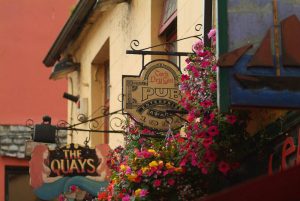Safeguarding Ireland’s tourism – ITIC’s 9 key policies

Tourism, Ireland’s largest indigenous industry and biggest regional employer needs “unprecedented support” if it’s to survive this existential crisis believes the Irish Tourism Industry Confederation.
Thus Ireland’s largest indigenous industry and biggest regional employer needs “unprecedented support” if it’s to survive this existential crisis believes the Irish Tourism Industry Confederation which represents the leading stakeholders in the sector.
The ITIC has identified nine key polices needed now and in the coming months so that the essential fabric of Ireland’s tourism industry is preserved:
1. Urgent, effective and speedy roll-out of vaccination programme and publication of key milestones. “There is significant frustration within the industry that Ireland seems to be slower than other countries in this regard,” states the ITIC, “Only with comprehensive vaccination can the tourism and hospitality industry reopen fully and begin trading again. Every week that there’s a delay is another week that businesses risk going under.”
2. Double Covid Restrictions Support Scheme and extend it to all tourism businesses with removal of current cap.
While good in principle, it’s flawed in practice with reports showing that the CRSS is costing the state significantly less than envisaged, according to the ITIC.
“Too many businesses, including a significant proportion within the tourism and hospitality industry, are not able to draw down the support,” it states, “The criteria for CRSS need to be relaxed for tourism and hospitality enterprises with the 10% calculation of weekly turnover doubled to 20% and the €5,000 cap removed.
“The Scheme should be made eligible to all tourism and hospitality businesses that see their turnover down 75% as a result of Covid restrictions. No other caveats or conditions should apply. Furthermore, certain tax-paying tourism sectors – including tour operators, boat rental businesses, visitor attractions, conference organisers, outdoor activity providers and caravan and camping operators amongst others – are being denied access to the Scheme and this needs to change as these sectors are key tourism assets that the country will need in a post-Covid world.”
3. Extend Employment Wage Subsidy Scheme at current levels for the rest of 2021. Based on negligible consumer demand for the coming months this Scheme needs to be extended at current levels for the sector for the rest of 2021, believes the ITIC, pointing out that everything must be done to keep employees linked to their employers for the future of the tourism industry going forward.
4. Double tourism budgets including business continuity grants, marketing funds and upskilling programmes. “The announcement in Budget 2021 of €55 million for tourism business grants was welcome however it needs to be distributed urgently to businesses throughout the country,” states the ITIC, “Furthermore, such is the scale of the crisis and the devastating impact of the current lockdown, that the fund needs to be increased. €100 million was quickly found for food producers at the end of December as a result of Brexit distribution challenges with applications to open at the end of this month – equally the tourism industry is facing its own massive challenges so funding needs to be ramped-up above current levels with a speedy distribution to vulnerable businesses.”
The ITIC also points out that funding international marketing efforts would be vital to allow Ireland compete on the global stage once the pandemic has passed.
5. Relaunch and redesign of Stay & Spend Scheme as a consumer-friendly voucher to encourage Irish people to holiday at home in 2021.
“The Stay & Spend Scheme – launched as part of last year’s July stimulus package – was flawed from the outset and was an unnecessarily complicated tax rebate,” states the ITIC, 9. “Even before the current Level 5, drawdown was negligible with Revenue Commissioners confirming last month a take-up of just 0.2% of original projections. The current restrictions – allied to the poor design – mean that the scheme needs to be relaunched as a consumer-friendly upfront voucher for every household, redeemable against any tourism and hospitality businesses as opposed to just accommodation and food. Evidently the voucher needs to be extended to the end of the year rather than the scheme’s current end date of April 30th.”
6. Extend waiver on local authority rates for all of 2021. The waiver on commercial rates introduced last year needs to be extended for the tourism and hospitality industry for all of 2021.
According to the ITIC, with demand set to be very low for the rest of the year, additional cost must not be charged to business by the state.
7. Replace current PCR testing regime with a cost-effective, rapid and scalable testing regime for international travel and to enable events. 75% of the Irish tourism economy depends on international visitation so the ITIC argues that there’s a fundamental necessity to restart international inbound access in a safe and sensible manner.
“The current PCR test requirement allied to the quarantine period effectively means there’s a closed sign above the country for holiday visitors,” it states, “As an island nation we are exclusively dependent on air and sea access. ITIC has been of the view for some time now that a multi-lateral cost-effective, rapid and scalable testing regime should replace the PCR tests – as used elsewhere in Europe – and these should be deployed so that flights and ferries can resume and domestic events and functions can take place safely.”
8. Continue VAT at 9% with no review until 2025. The VAT reduction for tourism services puts Ireland back on a competitive footing with our European peers. However the ending of the measure in December 2021 is “nonsensical”. This tax policy needs to be continued until 2025 to allow the industry to recover over this period of time, believes the ITIC which points out that there are also a number of VAT anomalies within the tourism industry that need to be addressed.
9. Secure six month moratorium on bank loans for businesses and mortgages for tourism employees. A moratorium on bank loans needs to be re-introduced to support business cash-flow. Vulnerable but viable businesses need to be supported in 2021 believes the ITIC, adding that, “It’s becoming increasingly apparent that employees of tourism and hospitality businesses are being viewed by financial institutions as high risk in relation to loans and mortgages. This is causing further unnecessary stress to our most valuable asset in tourism – ‘our people’ – and will cause an even greater exodus of vitally important skills. Banks should therefore also be asked to provide moratoriums to individuals employed in the tourism sector, assuming good credit ratings prior to Covid”.









